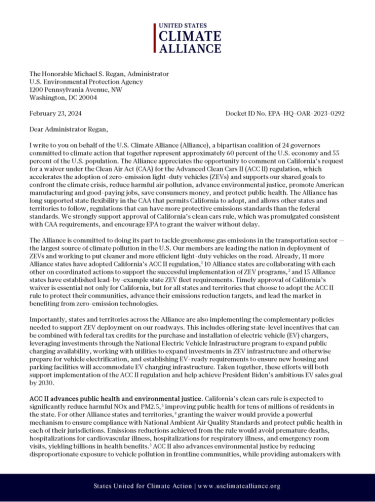Home / U.S. Climate Alliance Requests EPA Approval of California’s Clean Cars Waiver
- Letter
U.S. Climate Alliance Requests EPA Approval of California’s Clean Cars Waiver
February 23, 2024
The Alliance has long supported state flexibility under the Clean Air Act (CAA) that permits California to adopt, and allows other states and territories to follow, regulations that can have more protective emissions standards than the federal standards. In comments to EPA, the Alliance encouraged timely approval of California’s waiver request for the Advanced Clean Cars II (ACC II) regulation. ACC II accelerates the adoption of zero-emission light-duty vehicles and supports our shared goals to confront the climate crisis, reduce harmful air pollution, advance environmental justice, promote American manufacturing and good-paying jobs, save consumers money, and protect public health.
The Alliance stands firmly with California and its authority under the CAA to set its own vehicle emission standards, as well as the other states and territories that choose to voluntarily adopt those standards.
Read the Alliance’s full letter here.
About the Alliance
Launched on June 1, 2017 by the governors of Washington, New York, and California to help fill the void left by President Trump’s initial decision to withdraw the U.S. from the Paris Agreement, the Alliance has grown to include 24 governors from across the U.S. representing approximately 60% of the U.S. economy and 55% of the U.S. population. Governors in the Alliance have pledged to collectively reduce net greenhouse gas emissions by at least 26-28% by 2025, 50-52% by 2030, and 61-66% by 2035, all below 2005 levels, and collectively achieve overall net-zero greenhouse gas emissions as soon as practicable, and no later than 2050.
The Alliance’s states and territories will continue to advance innovative and impactful climate solutions to grow the economy, create jobs, and protect public health, and have a long record of action and results. In fact, the Alliance reduced its collective net greenhouse gas emissions by 19% between 2005 and 2022, while increasing collective GDP by 30%, and is on track to meet its near-term climate goal by reducing collective GHG emissions 26% below 2005 levels by 2025. The coalition’s states and territories are employing more workers in the clean energy sector, achieving lower levels of dangerous air pollutants, and preparing more effectively for climate impacts and executing more pre-disaster planning than the rest of the country.
###
